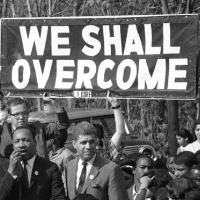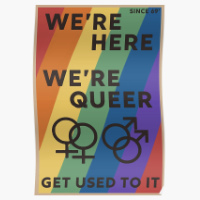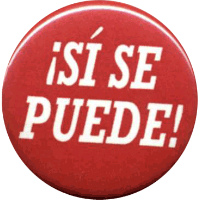

We're well behind the schedule of the actual World Cup, but that was always part of the plan. This is the second-to-last group of contenders to be revealed; the last set will be unveiled on Thursday. Here are the entries in the series so far:
And now, four slogans from movements that sought equality:

We Shall Overcome (1946-47): "We Shall Overcome" was, and is, a gospel song that dates back to the early 1900s. It was embraced as an anthem by elements of what would become the Civil Rights Movement in 1945, shortly after World War II ended. And the phrase was in use as a slogan by 1946 or 1947, although it did not become widely known until the late 1950s.
The slogan was a key part of the fabric of the Movement; it was chanted at the March on Washington in 1963 and at the Bloody Sunday march in 1965. Lyndon Johnson used it in speeches, and Martin Luther King Jr. built the final sermon he ever delivered around it. It was also adopted by other protest movements, sometimes as-is, sometimes with appropriate adaptations (e.g., the Mexican American version was "Nosotros Venceremos").
It is a little bit difficult to disentangle the impact of the song from the impact of the slogan, but beyond that, given the profound impact of the Civil Rights Movement, this one has the potential to go far.

We're Here. We're Queer. Get Used to It! (1969): We did not arrange things so that this entry in the series would run on the day Joe Biden signed the Respect for Marriage Act (see above), it just worked out that way. In any case, the 1960s were a different time when it came to LGBTQ Americans, and in that decade, the police in New York City were in the habit of raiding gay bars and arresting everyone therein on morals charges.
On June 28, 1969, the po-pos commenced what should have been a garden-variety raid on the Stonewall Inn. On this occasion, however, the gay patrons decided they'd had enough, and they resisted, sometimes violently. This launched two days of protests, at which participants chanted "We're Here. We're Queer. Get Used to It!" The Stonewall Rebellion, as it came to be known, is regarded as the starting point for the modern LGBTQ+ equality movement. And the slogan helped give the burgeoning movement a clear sense of the attitude it would adopt.

¡Sí, se puede! (1972): As we have noted a couple of times in this series, the origins of some slogans can be hard to nail down. Not so here. In 1972, Gov. Jack Williams of Arizona threw his weight behind legislation that would have devastated the local chapters of the United Farm Workers (UFW). UFW leader Cesar Chavez headed to Arizona to discuss the matter with Williams. When Williams refused a request to meet, Chavez launched a hunger strike with an eye toward getting the Governor recalled. It did not work, but during the hunger strike (which lasted 25 days), Chavez' partner-in-activism Dolores Huerta came up with the phrase "¡Sí, se puede!" It's usually translated as "Yes, we can!" although the UFW prefers "Yes, it can be done!"
The UFW was reaching the height of its influence in 1972, and Huerta's phrase served to rally the troops on many an occasion. In fact, it still does. Further, as with "We Shall Overcome," "¡Sí, se puede!" has been borrowed by outsiders for their own purposes. It was a little tacky when AeroMexico tried to trademark the phrase and use it as a marketing slogan (the airline was shamed out of doing so). It was considerably less tacky when Barack Obama adopted one of the English-language versions, "Yes, we can!" as his campaign slogan in both 2004 (for the U.S. Senate) and 2008.

Black Lives Matter (2013): Patrisse Cullors, Alicia Garza, and Opal Tometi organized the the Black Lives Matter Network in 2013, building their slogan right into the name of the (extremely decentralized) organization and movement. The slogan achieved wide recognition after several incidents of police violence, and the counter-protests they engendered, particularly the killing of Michael Brown in 2014 and the murder of George Floyd in 2020.
Black Lives Matter, both the movement and the slogan, managed to cause a fairly substantial reckoning for some Americans when it comes to the ongoing problems of racism and racial equality. However, the most compelling illustration of the efficacy of the phrase may be the reactions it generated. Quite a few people have been left foaming at the mouth by their resentment of Black Lives Matter; that gave us both Blue Lives Matter and White Lives Matter. It also gave us Kyle Rittenhouse and other violent counter-reactionaries. We struggle to think of a slogan that triggered a more profound backlash than this one.
The latest ballot is here. If you have comments on this group of slogans, and why you voted as you did, send 'em in. (Z)